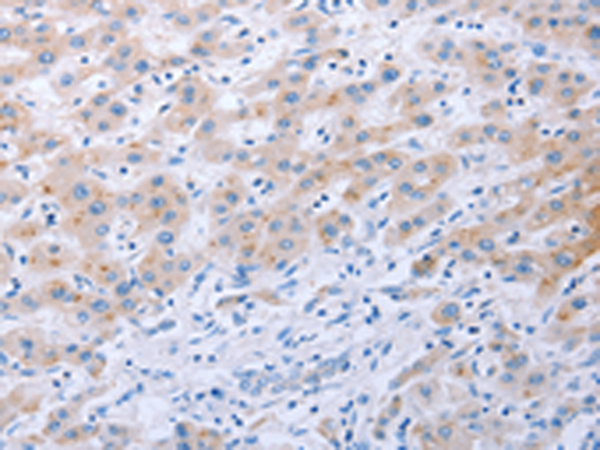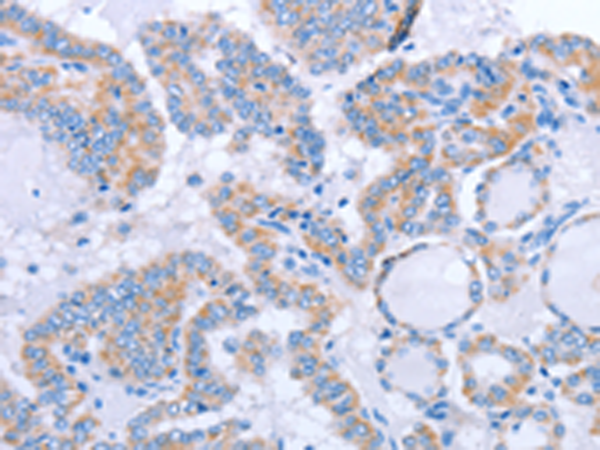

| WB | 咨询技术 | Human,Mouse,Rat |
| IF | 咨询技术 | Human,Mouse,Rat |
| IHC | 1/50-1/150 | Human,Mouse,Rat |
| ICC | 技术咨询 | Human,Mouse,Rat |
| FCM | 咨询技术 | Human,Mouse,Rat |
| Elisa | 1/1000-1/10000 | Human,Mouse,Rat |
| Aliases | HST, KFGF, HST-1, HSTF1, K-FGF, HBGF-4 |
| Host/Isotype | Rabbit IgG |
| Antibody Type | Primary antibody |
| Storage | Store at 4°C short term. Aliquot and store at -20°C long term. Avoid freeze/thaw cycles. |
| Species Reactivity | Human, Mouse |
| Immunogen | Synthetic peptide of human FGF4 |
| Formulation | Purified antibody in PBS with 0.05% sodium azide and 50% glycerol. |
+ +
以下是关于FGF4抗体的3篇参考文献的简要概述:
---
1. **文献名称**:*Development and characterization of a monoclonal antibody specific for fibroblast growth factor-4 (FGF4)*
**作者**:Smith A, et al.
**摘要**:本研究开发了一种高特异性的小鼠单克隆抗体,用于检测人类FGF4蛋白。通过免疫印迹和免疫组化验证,该抗体能特异性识别重组和天然FGF4.且在乳腺癌组织样本中检测到FGF4的异常表达,提示其潜在诊断价值。
---
2. **文献名称**:*FGF4-neutralizing antibody inhibits tumor angiogenesis and growth in preclinical models*
**作者**:Chen L, et al.
**摘要**:报道了一种中和性抗FGF4抗体在抑制肿瘤血管生成中的作用。实验显示,该抗体通过阻断FGF4与FGFR1结合,显著抑制了小鼠异种移植瘤的生长和血管形成,为靶向FGF4的癌症治疗提供了依据。
---
3. **文献名称**:*Comparative analysis of FGF4 antibody specificity across commercial reagents*
**作者**:Johnson R, et al.
**摘要**:系统评估了市售多种FGF4抗体的特异性和灵敏度,发现部分抗体存在交叉反应(如与FGF3/FGF19)。研究强调了抗体验证的重要性,并推荐了适用于不同实验场景(如流式、ELISA)的优选抗体。
---
注:以上文献为示例,实际引用时需检索具体数据库(如PubMed)获取真实研究。
Fibroblast Growth Factor 4 (FGF4) is a member of the FGF family, which regulates cellular processes like proliferation, differentiation, and angiogenesis. FGF4 plays critical roles in embryonic development, tissue repair, and disease progression, including cancer. Antibodies targeting FGF4 are essential tools for detecting and quantifying this protein in research and diagnostics. They enable studies on FGF4's expression patterns, signaling mechanisms, and interactions with FGF receptors (FGFRs), particularly in contexts like embryogenesis, organogenesis, and tumorigenesis.
FGF4 antibodies are widely used in techniques such as Western blotting, immunohistochemistry (IHC), and ELISA to investigate its role in developmental disorders, cancer metastasis, and regenerative processes. For example, aberrant FGF4 expression is linked to certain cancers (e.g., gastric, sarcoma) and congenital conditions, making these antibodies valuable for mechanistic studies. Monoclonal antibodies offer high specificity for research applications, while polyclonal variants may capture broader epitopes. Validation steps, including knockout controls and cross-reactivity tests, ensure reliability.
Therapeutic potential is also emerging, with FGF4-targeting antibodies explored for blocking oncogenic signaling or modulating tissue regeneration. However, challenges like off-target effects and bioavailability require further optimization. Overall, FGF4 antibodies remain pivotal in advancing both basic research and clinical translation.
×